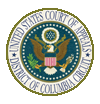- Courthouse
- Location
- Parking
- Public Transportation
- Courthouse Entrances
- Screening Information
- Electronic Device Policy of the U.S. Courts of the D.C. Circuit
- Courthouse Decorum Policy
- Liquids Policy
- Courtroom Locations
- Use of Facilities by Outside Groups
- Inclement Weather Notice
- Cafeteria
- Employment
- Solicitations
- Judges
- Resources & Contacts
- Case Information
- Attorney, Pro Se, and Media
- Advisory Committee on Judicial Conduct
- Notice of Change of Address
- Brief Compliance Checklist for Pro Se and Attorney Filers
- Notification of Scheduling Conflicts
- Attorney Admissions Information
- Criminal Justice Act Information and eVoucher
- Information for Litigants Representing Themselves (Pro Se)
- Attorney Rules of Disciplinary Enforcement
- Mediation Program
- Inclement Weather Notice
- Media Information
- Sealed Filings
- Submission of Audio or Video Files
- Rules & Procedures
- Circuit Rules
- Handbook of Practice and Internal Procedures
- Circuit Rules Proposed Amendments
- Circuit Rules Recent Amendments
- General Notices
- Guantanamo Cases - Orders Having General Application
- En Banc Endorsement of Panel Decisions (Irons Footnote)
- Mandatory Conflict Screening Plan
- Privately Funded Seminars
- Judicial Misconduct
- Site Map
Frequently Asked Questions
Who must attend mediation sessions?
The Court requires that counsel for each party, or another person with actual authority to settle the case, attend each mediation session. The Court’s Mediation Order also includes specific attendance provisions for cases involving the United States or District of Columbia governments. Failure of counsel to attend sessions may result in the imposition of sanctions.
Parties are strongly encouraged to attend mediation sessions. Mediators have the authority and discretion to communicate with the parties and request parties’ attendance. While rare, mediators may communicate directly with a party with or without counsel present. Mediation is most productive when persons with actual knowledge and interest in the outcome of the case participate in the discussions. Mediators generally will speak directly with the ultimate decisionmaker(s) before declaring an impasse or ending the mediation.
If a party is consulting with another individual besides their counsel in making decisions during the mediation process, that other individual may attend mediation sessions. They are also bound by the mediation confidentiality requirements. Any questions about someone’s attendance at a mediation session should be raised with the mediator.
